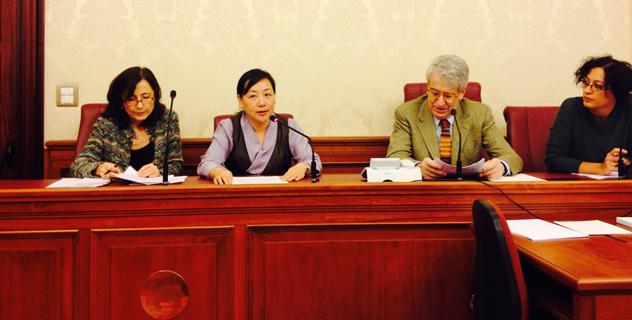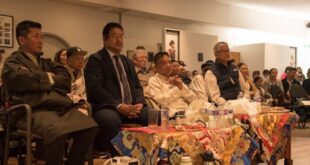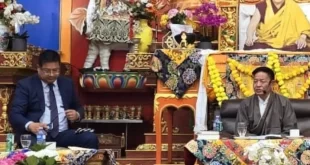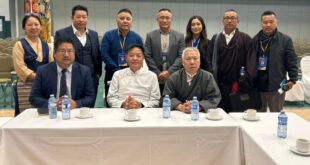tibet.net
March 13, 2014
DHARAMSHALA: The Special Committee on the Protection and Promotion of Human Rights of the Italian Senate has adopted a resolution on Tibet. The resolution came against the backdrop of a testimony by Kalon Dicki Chhoyang of the Central Tibetan Administration’s Department of Information and International Relations, at the Italian Senate last December.
In her testimony, Kalon Dicki Chhoyang spoke about the tragic situation of Tibet under the oppression of the Chinese government, and the continuing efforts and commitment of Tibetans to preserve their dignity and Tibetan culture. She has requested the Italian Senate to urge the Chinese government to engage in dialogue with His Holiness the Dalai Lama’s envoys to resolve the Tibet issue on the Middle Way Approach.
The resolution adopted by the Italian Senate’s human rights committee last week urged the Chinese government to bring an “immediate halt to the oppression of Tibetan people, and resume dialogue with the envoys of His Holiness the Dalai Lama for the implementation of a genuine autonomy for the Tibetan people.”
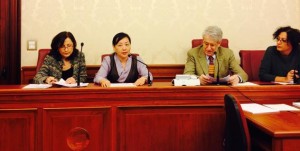
Expressing disappointment over the failure of EU-China dialogue to improve the human rights situation of the Tibetan people in any significant measure, it insisted that China should redouble its efforts to tackle human rights situation of the Tibetan people in the framework of the EU-China human rights dialogue.
It urged the Chinese authorities to respect Tibetan people’s freedom of language and culture and allow the teaching of Tibetan language in Tibetan schools.
The resolution firmly reiterates its appeal to the European Parliament to urge the Chinese government to ensure permanent and uninterrupted access of the press, diplomats including EU officials and foreigners in general, to Tibet.
The senate also urged the United Nations particularly the High Commissioner for Human Rights and the Human Rights Council to monitor the human rights situation in Tibet. It emphasised that Chinese authorities should comply with the outstanding requests of the UN and other human rights monitoring organisations to visit Tibet.
Full text of the Resolution
RESOLUTION ADOPTED BY THE SENATE SPECIAL COMMITTEE FOR THE PROTECTION AND PROMOTION OF HUMAN RIGHTS
The Committee,
WHEREAS
on 5 December 2013, the Senate Special Committee on the Protection and Promotion of Human Rights met with Mrs Dicki Chhoyang, Minister of Information and International Relations of the Central Administration of Tibet in Dharamsala, who described the tragic situation of Tibet under the oppression of the Chinese Government and emphasized the continuing efforts and commitment of Tibetans to preserve their dignity and Tibetan culture in exile;
starting in 2002, Tibetan officials have with Chinese government officials in nine negotiating rounds and have expressed the approach of the government of Tibet to pursue autonomy from Beijing, through the so-called middle way policy, with no recourse to violence;
the latest meeting with the Chinese authorities was held in January 2010: no concrete results were achieved and the dialogue of Tibetan officials with the People’s Republic of China (PRC) has since been interrupted;
the Dalai Lama resigned as Head of the Government in exile in 2011, thereby relinquishing his authoritative position in the organisation in favour of a democratically elected leader. Sikyong Lobsang Sangay was elected on 27 April 2011 and is the head of the Tibetan Government in exile in India;
on 4 June 2012, Lobsang Sangay accepted the resignation of His Holiness the Dalai Lama’s Special Envoy Mr Lodi G. Gyari, following the interruption of dialogue by the Chinese authorities;
ALSO WHEREAS
since the military occupation of Tibet in 1959, the PRC Government has implemented a policy of forced assimilation and marginalisation of Tibet, systematically denying the fundamental rights of Tibetans;
the crackdown of PRC authorities on protest in Tibet has led to the imposition of measures restricting freedom of expression, association and worship. Tibetans are also systematically marginalised in the economy and in terms of access to education;
the EU-China dialogue on human rights has failed to improve the human rights situation of the Tibetan people in any significant measure;
URGES THE GOVERNMENT TO
request the Chinese authorities to bring to an immediate halt any form of oppression in Tibet and all violence against the Tibetan people and its religious community and to respect fundamental rights in Tibet, particularly freedom of expression, association and worship;
foster the resumption of dialogue between the PRC Government and the envoys of the Dalai Lama, in order to identify a peaceful and shared settlement and to commence talks on the implementation of real regional autonomy in Tibet;
request the Chinese authorities to respect freedom of language, culture and religion for the Tibetan people and to include the teaching of the Tibetan language in the school curriculum in Tibet;
redouble efforts to tackle the human rights situation of the Tibetan people, in the framework of the EU-China human rights dialogue;
to reaffirm the requests already made by the European Parliament to the Chinese Government to ensure permanent and uninterrupted access of the press, diplomats including EU officials, and foreigners in general to Tibet;
to request monitoring of the respect for human rights in Tibet through the United Nations and particularly the High Commissioner for Human Rights and the Human Rights Council;
to insist with Chinese authorities so that they comply with the requests to visit Tibet made by UN bodies and human rights monitoring organisations, by means of a standing invitation, so as to help determine what has happened in that region.
